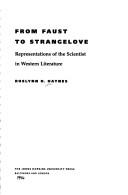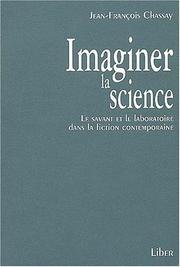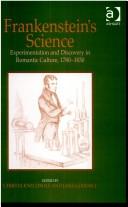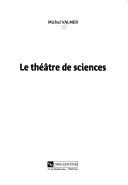| Listing 1 - 10 of 32 | << page >> |
Sort by
|
Book
ISBN: 9782020985659 2020985659 Year: 2009 Publisher: Paris: Seuil,
Abstract | Keywords | Export | Availability | Bookmark
 Loading...
Loading...Choose an application
- Reference Manager
- EndNote
- RefWorks (Direct export to RefWorks)
Les sciences ne peuvent échapper à la culture. C'est pourquoi la fiction, mieux souvent que l'histoire des sciences, montre comment elles changent nos perceptions du monde. La littérature puise dans l'activité scientifique des modèles, des formes, des métaphores. Les romans, mais aussi le théâtre, la BD, le cinéma, s'inspirent, de plus en plus souvent, de figures canoniques du monde scientifique. Sept d'entre elles, parmi les plus marquantes : Giordano Bruno, Galilée, Newton, Darwin, Marie Curie, Einstein et Oppenheimer, sont ici convoquées comme autant d'exemples emblématiques de ces échanges entre science et fiction. Les destinées de ces chercheurs, et les résonances de leurs découvertes, transposées par les romanciers, en font les révélateurs de tensions sociales et de crises intellectuelles qui débordent le contenu de leurs travaux scientifiques. Leur entrée en fiction fait de ces savants de papier les catalyseurs d'un imaginaire des sciences dont on ne saurait négliger ni l'importance, ni l'attrait.

ISBN: 0801849837 Year: 1994 Publisher: Baltimore, Md Johns Hopkins University Press
Abstract | Keywords | Export | Availability | Bookmark
 Loading...
Loading...Choose an application
- Reference Manager
- EndNote
- RefWorks (Direct export to RefWorks)
Comparative literature --- Thematology --- Literature and science. --- Scientists in literature.
Book
ISBN: 9786071609304 6071609305 Year: 2012 Publisher: México, D.F. : Fondo de Cultura Económica,
Abstract | Keywords | Export | Availability | Bookmark
 Loading...
Loading...Choose an application
- Reference Manager
- EndNote
- RefWorks (Direct export to RefWorks)
Literature and science. --- Scientists in literature. --- Literature and science
Book
ISBN: 0691121508 9780691121505 0691155445 9780691155449 0691188238 Year: 2006 Publisher: Princeton: Princeton university press,
Abstract | Keywords | Export | Availability | Bookmark
 Loading...
Loading...Choose an application
- Reference Manager
- EndNote
- RefWorks (Direct export to RefWorks)
"Science on Stage is the first full-length study of the phenomenon of "science plays"--Theatrical events that weave scientific content into the plot lines of the drama. The book investigates the tradition of science on the stage from the Renaissance to the present, focusing in particular on the current wave of science playwriting. Drawing on extensive interviews with playwrights and directors, Kirsten Shepherd-Barr discusses such works as Michael Frayn's Copenhagen and Tom Stoppard's Arcadia. She asks questions such as, What accounts for the surge of interest in putting science on the stage? What areas of science seem most popular with playwrights, and why? How has the tradition evolved throughout the centuries? What currents are defining it now? And what are some of the debates and controversies surrounding the use of science on stage? Organized by scientific themes, the book examines selected contemporary plays that represent a merging of theatrical form and scientific content--plays in which the science is literally enacted through the structure and performance of the play. Beginning with a discussion of Christopher Marlowe's Doctor Faustus, the book traces the history of how scientific ideas (quantum mechanics and fractals, for example) are dealt with in theatrical presentations. It discusses the relationship of science to society, the role of science in our lives, the complicated ethical considerations of science, and the accuracy of the portrayal of science in the dramatic context. The final chapter looks at some of the most recent and exciting developments in science playwriting that are taking the genre in innovative directions and challenging the audience's expectations of a science play. The book includes a comprehensive annotated list of four centuries of science plays, which will be useful for teachers, students, and general readers alike."--Publisher's website.
Drama --- Science in literature --- Scientists in literature --- History and criticism --- Science in literature. --- Scientists in literature. --- Drama. --- Wissenschaft --- 1900-1999. --- Drama - 20th century - History and criticism

ISBN: 2895780285 9782895780281 Year: 2003 Publisher: Montréal, Que. Liber
Abstract | Keywords | Export | Availability | Bookmark
 Loading...
Loading...Choose an application
- Reference Manager
- EndNote
- RefWorks (Direct export to RefWorks)
Thematology --- French literature --- Science in literature. --- Scientists in literature. --- Fiction --- History and criticism.

ISBN: 9780754654476 0754654478 9781315255033 9781351935821 9781138257993 Year: 2008 Publisher: Aldershot Ashgate
Abstract | Keywords | Export | Availability | Bookmark
 Loading...
Loading...Choose an application
- Reference Manager
- EndNote
- RefWorks (Direct export to RefWorks)
Shelley, Mary W. --- Frankenstein (Fictitious character) --- Frankenstein, Victor (Fictitious character) --- Literature and science --- Romanticism --- Science in literature. --- Science --- Scientists in literature. --- History --- Shelley, Mary Wollstonecraft, --- Frankenstein (Fictitious character). --- Frankenstein, Victor (Fictitious character). --- Shelley, Mary --- Science in literature --- Scientists in literature
Book
ISBN: 9782130570127 2130570127 Year: 2010 Volume: *28 Publisher: Paris: Presses universitaires de France,
Abstract | Keywords | Export | Availability | Bookmark
 Loading...
Loading...Choose an application
- Reference Manager
- EndNote
- RefWorks (Direct export to RefWorks)

ISBN: 0801848016 Year: 1994 Publisher: Baltimore Johns Hopkins University Press
Abstract | Keywords | Export | Availability | Bookmark
 Loading...
Loading...Choose an application
- Reference Manager
- EndNote
- RefWorks (Direct export to RefWorks)
Literature and science --- Scientists in literature --- Poetry and science --- Science and literature --- Science and poetry --- Science and the humanities
Book
ISBN: 1108759076 1108759637 1108676537 9781108759076 9781108759632 9781108676533 Year: 2020 Publisher: Cambridge, England : Cambridge University Press,
Abstract | Keywords | Export | Availability | Bookmark
 Loading...
Loading...Choose an application
- Reference Manager
- EndNote
- RefWorks (Direct export to RefWorks)
Theatre has engaged with science since its beginnings in Ancient Greece. The intersection of the two disciplines has been the focus of increasing interest to scholars and students. The Cambridge Companion to Theatre and Science gives readers a sense of this dynamic field, using detailed analyses of plays and performances covering a wide range of areas including climate change and the environment, technology, animal studies, disease and contagion, mental health, and performance and cognition. Identifying historical tendencies that have dominated theatre's relationship with science, the volume traces many periods of theatre history across a wide geographical range. It follows a simple and clear structure of pairs and triads of chapters that cluster around a given theme so that readers get a clear sense of the current debates and perspectives.
Drama --- Literature and science. --- Theaters --- Scientists in literature. --- Science in literature. --- History and criticism. --- Stage-setting and scenery.

ISBN: 2271063795 9782271063793 Year: 2005 Publisher: Paris: CNRS,
Abstract | Keywords | Export | Availability | Bookmark
 Loading...
Loading...Choose an application
- Reference Manager
- EndNote
- RefWorks (Direct export to RefWorks)
Depuis leur origine dans la Grèce ancienne, le théâtre et la science entretiennent des liens complexes, passionnels et fertiles. Croisant réflexions théoriques et expériences de terrain, Michel Valmer s’attache à décrire les effets produits sur l’art théâtral lorsque celui-ci évoque la science. Après avoir repéré les principes constitutifs et les figures régulièrement à l’œuvre dans le théâtre de sciences -- le binôme du Fou et du Savant, le théâtre-machine ou l’acteur-objet -- il analyse trois mises en scène de textes de Strindberg, Kleberg et Gatti et nous propose in fine des entretiens avec des praticiens. Producteur d’émotion réflexive, le théâtre de sciences pose la question de la place de l’homme dans un monde occidental gouverné par la technoscience.
Theatrical science --- anno 1900-1999 --- European drama --- Science in literature. --- Scientists in literature. --- History and criticism. --- European drama - History and criticism.
| Listing 1 - 10 of 32 | << page >> |
Sort by
|

 Search
Search Feedback
Feedback About UniCat
About UniCat  Help
Help News
News